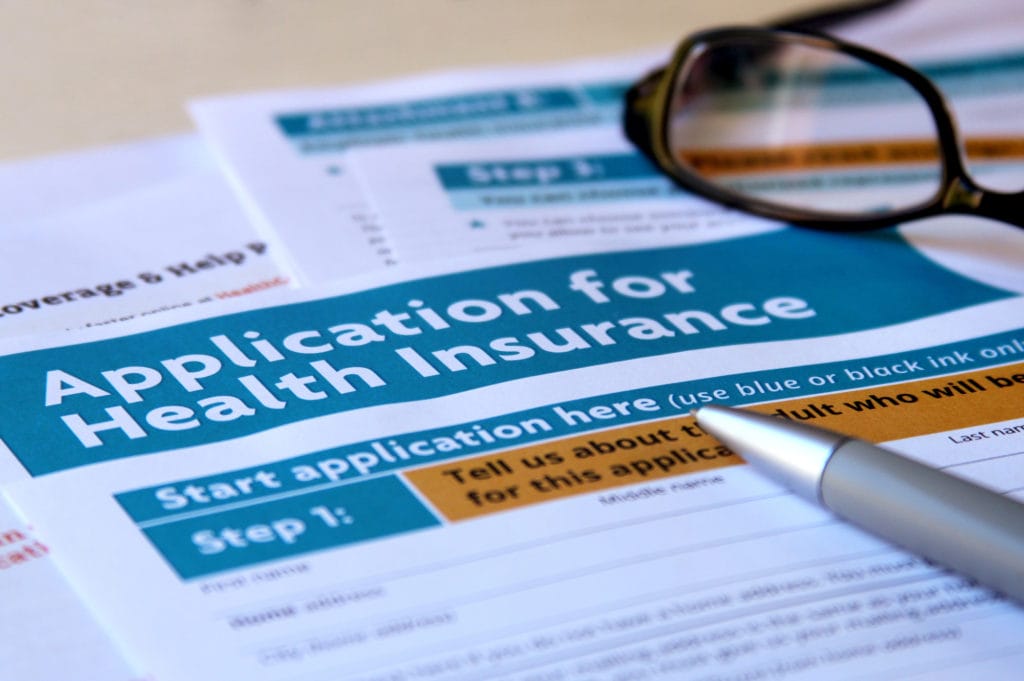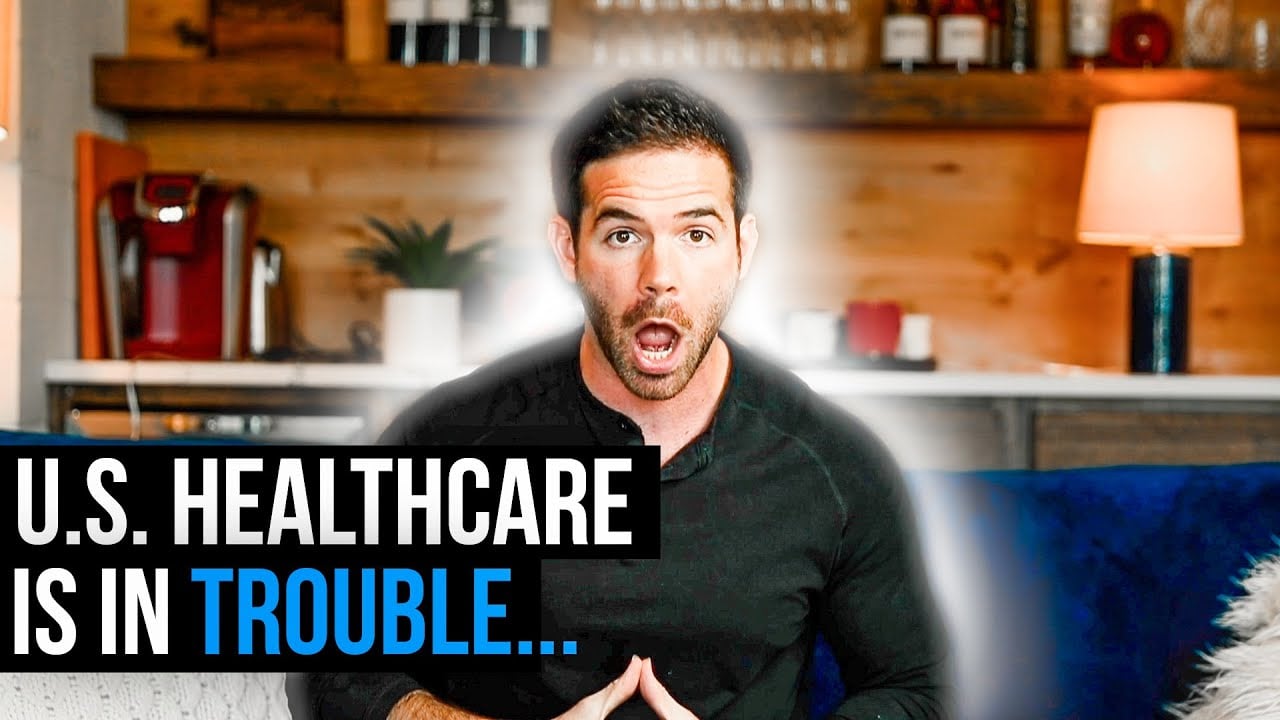The United States healthcare system has been ailing for half a century. Politicians on both sides of the aisle propose plans that align with their agendas, but none actually makes sense. We've tried to regulate, stimulate, and mandate our way to a better system. But all we've accomplished is a more bloated, wasteful, and truly disgraceful mess. The conversation has devolved into a partisan tug-of-war, with the American people's health held hostage.
It's time for solutions. This one makes sense. It's compassionate, cost-effective, and increases neither the federal government's reach nor the number on your tax bill.
"In 2019, 8.0 percent of people, or 26.1 million, did not have health insurance at any point during the year."
We All Agree: People Need Quality, Affordable, Accessible Healthcare
We also all agree that the current system is broken. But that's where political agreement reaches a dead end. One side wants to reduce government involvement. The other wants the government to provide healthcare. The World Health Organization considers healthcare a universal human right. To put it mildly, emotions get a little hot over this issue.
There's a lot at stake for everyone involved. Unfortunately, trying to have a calm, rational discussion about healthcare is like navigating a minefield.
If you say there's waste in some of the existing programs, you're a heartless monster trying to cut programs poor people depend on. You're heartless, careless… and our favorite, "You must be a capitalist!"
Suggest the possibility that the government could create a program that helps people who are struggling? You're a socialist. But even billionaire investor Charlie Munger, the personification of capitalism to some, says that our healthcare system is a "national disgrace" and should be replaced with a single-payer model.
"The system is ridiculous. If a young family has to pay a $5,000 deductible to have a baby, they don't really have medical insurance."
Charlie Munger
Berkshire Hathaway
We Also (Mostly) Agree on the Challenges Before Us
There's a reason this healthcare debate has endured for so long. It's a complicated and far-reaching issue.
The United States government has the most expensive healthcare system in the world. More than half of our federal budget goes to entitlements (primarily Medicare and Medicaid). Despite the increase in spending and the mountain of legislation we've created trying to fix this problem, we've not made much headway. Costs continue to rise. American citizens' satisfaction with the healthcare system continues to plummet.
But is this a hopeless situation? Not at all.
While we may be more divided than we've ever been as a nation, this is an issue we universally desire to solve. It's a problem that is bigger than politics. It is an issue that defines our humanity, our character, and our future.
The Capitalist Proposal for an Ethical, Efficient, and Effective Healthcare Plan
First things first. If we hope to create a healthcare system that works, we must agree on a set of goals. Sadly, politicians are more interested in fighting across the aisle than solving this problem. We cannot settle for mudslinging, talking points, and bills that only look good on a politician's resume. Progress here is impossible until and unless we come back to a unified set of goals and principles.
That said, here are the three main priorities of a new healthcare proposal. Our system must:
- Be compassionate.
- Let the free market do what it does best.
- Not increase government spending or power.
"The King will reply, 'Truly I tell you, whatever you did for one of the least of these brothers and sisters of mine, you did for me.'
Matthew 25:40
A Compassionate Plan
We must take care of "the least of these." The purpose of any government safety net is to catch those in danger of falling through the cracks. Any bill or system that doesn't do this effectively is a waste of our time. Until now, most bills coming out of Congress address insurance or pharmaceutical companies. Or they ignore this prime directive entirely.

Our healthcare reform must serve those who need help the most, those who cannot afford or access the care they need. Whether you believe healthcare should be free or that the marketplace should run rampant, the primary goal of any discussion should be how we will get care to those who need it most.
"That government is best which governs least."
Henry David Thoreau
Civil Disobedience
A Plan that Leverages the Power of the Free Market
The market is not perfect, but it is very good. A free and unfettered market does a few things really well:
- Drives down costs
- Brings medical innovation to the table
- Distributes goods at the fastest rate possible
Yes, the marketplace has its flaws. But there has never been a better system devised for inventing, manufacturing, and distributing goods than the free market.
Unfortunately, we don't have a free market in healthcare. Not even close. We have a highly regulated and very costly regulated marketplace.
Why does this matter?
Because expanding government involvement poses a real danger. It slows innovation and drives up costs.
Most progressive arguments would disagree with that statement. They'd argue that government involvement in the healthcare industry will drive costs down. That's a fallacy.
We only need to look at the Affordable Healthcare Act for proof. Yes, the AHA drove costs down for some individuals. But costs increased dramatically for us all as a collective.
If our goal is to make high-quality healthcare available and accessible to every man, woman, and child, a free marketplace plays a critical role. We dare not hobble the power of competition to make healthcare work for everyone.
"A burden shared is a burden halved."
Proverb
A Plan that Does Not Raise Taxes
Many of us remember hearing, "Read my lips. No. New. Taxes." We also remember hearing, "If you like your doctor, you can keep your doctor. If you like your insurance plan, you can keep your insurance plan."

So, if the idea that a plan to fix the healthcare system can help more people, provide better care, and not cost one dime more sounds dubious, that's understandable. Still, any new plan we create has to be marketable to get implemented.
Our current healthcare system is the most expensive in the world. That distinction stems not from it being the best but because it is the most wasteful.
Some say we should just raise taxes for the rich to cover the cost of a better solution. However, that won't work.
Why? Because giving the government more money to spend doesn't solve the problem. On the contrary, it just makes existing problems bigger. The only way government programs become more effective is for them to become more efficient. With fewer tax dollars to deploy, we would force the government to make better decisions. Our federal budget is already nearly $5 trillion. We don't lack an effective healthcare system because we don't have the money to pay for it. The opposite may be true.
In short, the healthcare system in the United States must take care of the least of these. It must not interfere with the marketplace. And it must not raise taxes.
Is Such a System Even Possible? The Answer Is Yes.
Here's how we can fix it for good.
Create healthcare relief programs that directly help those who would otherwise struggle to cover their healthcare bills.
In the past, we've tried to prevent costs from rising or regulating the healthcare industry. That doesn't work. This plan would work a bit like how the government sent stimulus checks during the COVID-19 pandemic. As another example, we could do it similarly to how the student loan programs work. The federal government could provide direct payments to cover burdensome medical bills by establishing block grants for state governments.
Take it to the State Level
We would base these block grants on the population of each state. The federal government's job would be to create a big cash pool to distribute to all the states. The state would decide who gets these funds, earmarked for individuals who cannot pay their healthcare bills.

An example:
A low-income person with a $100,000 medical bill for cancer treatment applies to have their bill forgiven. It wouldn't be forgiven the way many want student loans forgiven. It would be paid for by the state grant that the federal government set up. The hospital, doctors, and other healthcare providers get paid. The patient moves on without filing bankruptcy or bearing an impossible financial burden… all because the federal government set up state grants to cover these bills.
Where Would the Money Come From?
Remember, we said this plan could not increase taxes. So, how do we pay for it?
We would need to come together as a nation to take a stand. We'd need to come to an understanding that we are all in this together. Instead of raising taxes, we would simply implement a 10% "haircut" for all discretionary spending in the United States.
What's discretionary spending? Essentially, that's politicians setting the annual budget, deciding what they'll spend and where. The current discretionary spending total is about $1.6 trillion per year.
If we, as a country, determined to curb our discretionary spending by just 10%, we would free up nearly $200 billion. We would create a pool of cash we could distribute to those in need. This haircut would yield hundreds of billions of dollars. And we would do all this without raising taxes one penny. In fact, it's likely we'd see no noticeable difference in daily life after such a haircut.
What Gets Cut?
10% of everything.
- 10% of military spending? Yes.
- 10% of Congress people's salaries? Yes.
- 10% of art grants? Yes.
- 10% of the Department of Energy? Yes.
10% of ALL discretionary spending would go into this cash pool for health care block grants on the state level. People in need apply for assistance through their state's grant program. If approved, the grant money covers their medical bills.
Wait, There's More
Not only would this plan solve a previously insurmountable problem for our nation. But there are some other perks we can foresee.
First, it would likely lead to a reduction in waste in Medicare and Medicaid. That's because some elements of this program would replace the bloated bureaucracy in those organizations.

That leads us to an additional funding source for this program. Because this program would provide direct payments to cover our citizens' medical bills, we'll see a significantly streamlined and far more efficient use of our tax dollars than we see with large federal programs.
Typically, when we decide to fix a problem, it results in more government, which is inefficient and expensive. Take the Department of Education. As a nation, if we want to improve our education system, we increase the DoE. We create large new bills and initiatives that cost billions of dollars. Lobbyists then fight to get their piece of the pie.
More Cost-Effective than Taxation
The bigger the department, the bigger the waste. When we tax individuals, $.50 of every dollar collected goes to pay salaries of government employees. Only half of that dollar goes toward the work the program was set up to do in the first place.
But by making direct payments to cover individuals' medical bills, we eliminate most of that waste. That means we have more resources available to provide relief for those who need it most.
How This Plan Gets Even Better
We could also incentivize corporations and individuals to add to their state's grant fund. That might look like a two-to-one tax write-off for the state grant program.
An example:
Let's say a large company in Arizona wants to reduce its federal tax bill. They could make a $1 million donation to their state healthcare fund. In doing so, they would get a $2 million tax write-off from the federal government.
Why a two-for-one tax write-off? Because by eliminating government bureaucracy costs, we free up more money for the state healthcare program. Instead of the federal government collecting $2 million in taxes and hoping it trickles its way through messy, wasteful government programs, the money takes a direct route. It goes straight to the state's cash pool to cover medical bills for individuals in that state who need help.

Donors (and the federal and state governments) win in several ways:
- First, it's great for public relations. They can boast about their commitment and involvement with their community. They'll also get to see a more direct impact of their generosity.
- Second, they'll likely become more politically active in their state and less involved on the federal level. Since their tax dollars will go straight to their state, they'll become more engaged on a local level instead of lobbying politicians on the national level.
- Third, we will save tax dollars and eliminate long-term costs for everyone involved. The business saves on taxes because the two-to-one write-off becomes cost-neutral. The federal government saves because there's less bureaucracy to fund and manage. The state wins because it now has more money to distribute to its citizens. Citizens win because now they have the best healthcare program possible.
That tiny 10% federal haircut will create several hundred billion dollars states will distribute directly on behalf of individuals who need help paying their medical bills. No new taxes; nobody left with a crippling medical bill.
What about the Government?
The simplicity of this plan makes it not only feasible but also takes politics out of the matter. Because there's no complicated bill for Congress to pass, there's no need for arguments about how expensive the plan will be - or how much we'll raise taxes. We can altogether avoid discussing deficit spending to make this work. In the end, the federal government gets less involved rather than more entrenched.
Perhaps most importantly, this plan puts pressure on the United States government to be more efficient. The more efficient it becomes, the more dollars get freed up to directly help individuals, families, and households.
This is how we can start to bridge the divide on divisive issues. This is how we can increase healthcare coverage in America effectively. And this is how we can begin to loosen the hold that the federal government has on a bloated and inefficient healthcare system.
We simply cut other programs, freeing up dollars to provide relief on the state level. Further, we incentivize wealthy individuals and corporations to increase the amount of cash available to distribute directly to those who need it most.
What about Health Insurance Providers?
This plan further incentivizes the marketplace to do what it does best. In particular, since we're not regulating insurance providers, there's more competition among insurers. That drives costs down. That's because the default plan is cost forgiveness. This would create downward pressure on insurance premiums instead of the skyrocketing costs we currently see. Insurance companies would become more creative rather than more burdened by regulation.

This kind of program could help reduce regulations rather than increase them. We will directly support those who need care the most in the most efficient, direct, and charitable way possible. Instead of arguing about the other side being cutthroat and selfish, we celebrate how many individuals we've helped. Every state can champion the effectiveness of their grant program, publicly boasting about how many lives they've affected positively.
In Short...
This plan leads to less government instead of more. It's a plan that will drive costs down rather than up. And it's a plan that will increase marketplace innovation rather than hold it back.
Many times the solution is less government and more capitalism. In this case, it is both less government and more compassion while letting capitalism bring new innovations to the marketplace.











